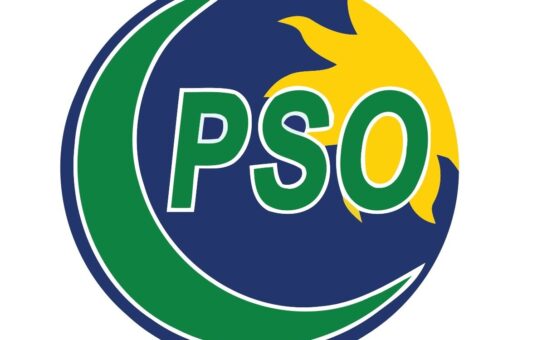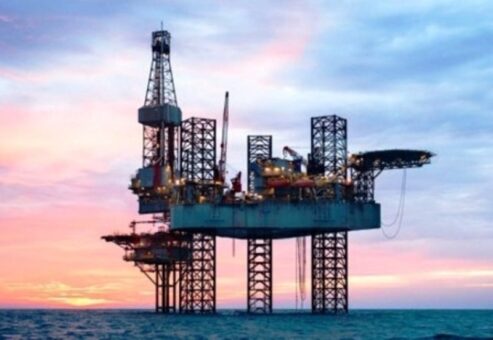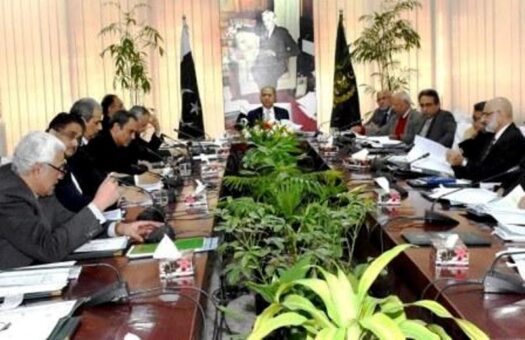ISLAMABAD: Economic Coordination Committee of the Cabinet (ECC) on Tuesday allowed release of Rs10 billion as subsidy and government bank guarantee up to Rs50 billion for Liquefied Natural Gas (LNG).
(more…)Tag: LNG
-

Pakistan approves LNG at $9 per MMBTU for export sector
ISLAMABAD: Pakistan on Monday approved a rate of $9 per MMBTU for supply of LNG to export sector across the country.
The country’s apex economic coordination body approved the rates to provide competitive environment to the export sector at par with regional economies.
READ MORE: NEPRA to conduct public hearing on KE’s petition on July 28
Federal Minister for Finance and Revenue Miftah Ismail presided over the meeting of the Economic Coordination Committee (ECC) of the Cabinet at Finance Division, on Monday.
Federal Minister for Defence Khawaja Muhammad Asif, Federal Minister for Commerce Syed Naveed Qamar, Federal Minister for Industries and Production Makhdoom Syed Murtaza Mehmood, Federal Minister for Power Khurram Dastgir Khan, Shahid Khaqan Abbasi – MNA, Minister of State for Finance and Revenue Dr. Aisha Ghous Pasha, Minister of State for Petroleum Mr. Musadik Masood Malik, Rana Ihsan Afzal, Coordinator to PM on Commerce & Industry, Federal Secretaries and senior officers attended the meeting.
READ MORE: Revised power tariff, taxes on electricity bills in Pakistan
Ministry of Commerce presented a summary on regional competitive energy rates for export oriented sectors during financial year 2022-23.
It was submitted that in pursuance of the decisions of ECC dated August 16, 2021 and the Federal Cabinet dated August 24, 2021, the government provided energy to the export oriented sectors namely Textile including Jute, Leather, Carpet, Surgical and Sports goods at regional competitive rates to reduce cost of manufacturing and enhance exports.
The ECC after detailed discussion approved RLNG rate at US $9 per MMBTU, all inclusive to five export oriented sectors across Pakistan for existing gas connections.
READ MORE: K-Electric, Siemens sign deal for KKI Grid construction
A subsidy cover of Rs. 40 billion for RLNG has been allocated under Federal budget 2022-23 which will be reviewed on quarterly basis.
Further, ECC recommended to the Federal Cabinet to raise the tariff of indigenous gas for export oriented sectors at Rs. 1350 per MMBTU and for general industry at Rs. 1550 per MMBTU.
The ECC also approved the electricity rate at US cents 9 per kWh to five export oriented sectors from 1st August 2022 subject to (i) subsidy of Rs. 20 billion provided by Finance Division (ii) quarterly review of the subsidy (iii) Petroleum Division will provide a list of industrial units getting subsidized gas and electricity, within one month to the ECC for review.
READ MORE: Rupee devaluation severely affects KE’s profitability
The committee approved supplementary grant of Rs750 million for Ministry of Information and Broadcasting for 75 years’ Independence Day celebrations.
The ECC also approved proposal of Ministry of Interior for payment of compensation/goodwill package from its own budget.
-

Govt urged to minimize reliance on LNG import
ISLAMABAD: As Pakistan is facing with severe natural gas shortage for the last couple of years, it has started relying heavily on Liquefied Natural Gas (LNG), however, the government needs to explore other energy sources to save environment as well as financial spending on the LNG import.
There are other green energy options like solar and wind that can provide cheap environment-friendly energy sources and the country needs go for these options.
This was the crux of one of the two reports “Gas Monitor – Pakistan” & “Tabeer LNG Terminal, Socio-Economic & Environmental Analysis” launched by the Indus Consortium held about the gas provision as an energy source in the country at a ceremony here on Friday.
The reports launch was attended by representatives of academic institutions, member of GROW Green Network, which is an umbrella of environmental organizations of Pakistan working for the promotion of renewable energy, independent researchers, member of Renewable Energy coalition Pakistan and alliance for climate Justice and clean energy.
Sharing findings of the Gas Monitor – Pakistan report, Dr. Amanullah Mahar, Director, and Center for Environmental Sciences, University of Sindh, Jamshoro, said that since LNG, fossil gas is a very high carbon intensive fuel and cannot be called “transition” fuel source to a cleaner energy system.
He explained that fossil gas (methane) can be leaked from the re-gasification, transport, and consumption and processing of it. After carbon dioxide (CO2), methane is the second most abundant anthropogenic greenhouse gas and responsible for 20% of worldwide atmospheric emissions. The methane is 25 times more potent than CO2 at absorbing atmospheric heat.
While presenting findings of another report on “Tabeer LNG Terminal, Socio-Economic & Environmental Analysis”, an independent sustainability consultant Fatima Fasih said that keeping the global LNG markets and their volatility in consideration, it is clear that LNG is no longer a financially-viable source of fuel.
She said, “Instead of focusing on short-term monetary gains and quick gains in energy for the economy, public and private institutions should focus on building stronger energy security within Pakistan and develop a greener economy through a just and equitable energy transition towards renewable energy.”
She suggested that solar and wind power have shown remarkable success in Pakistan from an economic perspective and should be invested in to increase their ratios within the country’s energy mix and help the country transition towards a just and sustainable energy transition.
Iqbal Hyder, Board member of Indus Consortium and Executive Director Laar Humanitarian Development Program (LHDP), while concluding his remarks, said that the livelihood of population inhabiting along the coastal areas is directly dependent on mangrove forests.
He said cautioned that any additional construction or industrial operations in these areas will exacerbate the declining socio-economic conditions of the local communities. “We need to recognize the valuable indigenous knowledge for local fishing and rejuvenate the current worsening fishing populations.”
The Gas Monitor – Pakistan report focuses on the case of the development of Pakistan’s gas sector, especially LNG. It discusses how increasing reliance on LNG is posing challenges to the country’s economy on one hand and the release of methane gas emissions is deteriorating the environment on the other.
The monitor also comes up with a set of recommendations that present a potential way out of this entrenched dependence and its associated impacts.
An analysis of the socio-economic and environmental impacts of the Tabeer LNG terminal, Port Qasim, Karachi, investigates the Environmental Social Impact Assessment (ESIA) and explores the Corporate Social Responsibility criterion with a set of recommendations.
Indus Consortium is an umbrella organization of over 60 civil society organizations across Pakistan, working on DRR, climate change, green development, and green finance. It also envisions a democratic and equitable society where all citizens enjoy equal economic, cultural, and political rights, with a mission to work for local communities to enhance their resilience and participation in green development.
-

PSO’s prudent planning helps considerable savings
KARACHI: Prudent planning and strategic thinking. Pakistan State Oil (PSO) has enabled considerable savings and created value for end users by taking the following steps:
As of today, PSO has scrapped the spot tender for October 22-23, 2021, and replaced it with cargo under the long-term contract from Qatar Gas using contractual provisions and prudent rescheduling, said a statement issued on Wednesday.
PSO strategically planned for winters (Jan-Feb 2021 & Nov-Dec 2021) in advance, when spot prices are usually at their highest, and arranged 28 cargoes instead of 20 under long-term contracts (6 cargos each in Jan and February 2021 & 7 cargoes each in November and December 2021). This has been planned to meet the ever-increasing gas demand in winters at the lowest possible rates. Compared with current spot market rates, this translates into approximate savings of $295 million.
PSO has also enabled considerable savings by reducing the number of spot cargoes from 12 to 4 in the year 2021 using contractual provisions available while maximizing long-term cargoes through contracts from 60 to 70.
Furthermore, the company has reduced the suspension period of LNG supply in Sep 2021 owing to scheduled FSRU dry dock activity from approximate 90 hours to 60, by bringing the FSRU laden with cargo under the long-term contract with Qatar, thereby curtailing the downtime for the industry and saving considerable cost to the economy.
PSO is committed to safeguarding Pakistan’s national interest through effective planning and making the best possible decisions.
-

Pakistan oil sales jump up by 26% in August
KARACHI: Pakistan’s domestic oil sales have jumped up by 26 percent to 1.97 million tons, which is the highest since May 2018.
Analysts at Topline Securities said that oil sales are also up 1 percent Month on Month (MoM), whereas oil sales during the first two months of the fiscal year 2021/2022 clocked in at 3.9 million tons, up 22 percent YoY.
Furnace oil sales improved by 63 percent YoY to 0.5 million tons in Aug-2021 primarily led by rising LNG prices and shortage in world LNG supply which is an alternative fuel for FO.
Growth in oil sales is also fueled by economic recovery as last year’s sales were mainly impacted by lockdowns and economic slowdown.
Consequently, MOGAS (MS) and High-Speed Diesel (HSD) sales are up 6 percent YoY and 32 percent YoY, respectively. Strong auto sales have also led to growth in these categories during the period under review.
Company-wise data shows that Pakistan State Oil (PSO), Attock Petroleum (APL) and Shell Pakistan (SHEL) have gained in terms of their market share.
PSO posted growth of 36 percent YoY as its oil sales clocked in at 1.0 million tons. PSO’s FO sales have jumped by 80 percent YoY as its market share in this segment improved to 66 percent in Aug-2021 vs. 60 percent in Aug-2020.
APL’s oil sales also improved by 56 percent YoY to 0.2 million tons, whereas SHEL’s sales are up 28 percent YoY to 0.1 million tons.
HASCOL witnessed a decline of 76 percent YoY in Aug-2021 as it continues to lose its market share as it stands at just 1 percent compared to 10 percent 3-years back.
-

PSO issues clarification LNG purchase
KARACHI: Pakistan State Oil (PSO) has clarified reports about purchase of Liquefied Natural Gas (LNG) on higher prices.
In a statement on Sunday the company clarified that:
No cargo from long-term supply contract in September has been dropped or canceled by PSO as reported by certain media outlets. As per the Annual Delivery Plan (ADP) agreed with all stakeholders, 04 cargoes were to be supplied under the long-term contract in the month of September and 02 spot deliveries were planned.
PSO’s long-term contract for 60 cargoes a year is not equally divided over 12 months. PSO prudently planned winter (Jan-Feb & Nov-Dec) in advance, when spot prices are usually higher, and arranged 28 cargoes instead of 20 under the long-term contracts -24 cargoes from the existing long-term contract and 4 additional cargoes from the recently executed long-term contract commencing in January 2022 by exercising contractual rights. This has been planned to meet the ever-increasing gas demand in winters at the lowest possible rates.
PSO has enabled considerable savings through effective planning and contract management by reducing the number of spot cargoes from 12 to 6 this year using contractual flexibilities available while maximizing long-term cargoes through contracts from 60 to 70.
As far as the timing of the tenders is concerned, awarding cargoes ahead of the required delivery windows or awarding a strip of cargoes in one go does not suit PSO since the company has certain contractual flexibilities available under long-term contracts and spot purchases are very few in a year as mentioned above. For e.g. due to the unplanned Dry Dock activity of FSRU in Jun-Jul and uncertain situation in September considering scheduled FSRU replacement, had PSO awarded July and September spot cargoes in advance, the company would have had to either drop much cheaper contractual cargo or face Take or Pay penalty. Therefore, spot purchases are finalized after carefully seeing the demand-supply dynamics and market conditions.
The bids received against the required deliveries in September 2021 are yet to be awarded by PSO. As per procedure, the received bids will be presented to the company’s Board of Management along with the supply/demand situation & global price trends and a decision will be arrived at accordingly.
Considering that 2021 has seen exceptionally high LNG prices in international market, the planning and management of contract done by PSO will not only absorb the impact of higher spot prices but also result in potential savings. As the national flag bearer, PSO is committed to safeguarding national interest and leaves no stone unturned to fuel the country’s progress.
-

FPCCI demands withdrawal increase in duty, taxes on CNG sector
KARACHI: Federation of Pakistan Chambers of Commerce and Industry (FPCCI) on Monday demanded the government of withdraw its decision of increasing duty and taxes on CNG sector.
In a statement FPCCI President Mian Nasser Hyatt Maggo said that the sales tax on LNG for CNG sector has been increased from 5 per cent to 17 per cent – while customs duty of 5 per cent has also been imposed. “Given that CNG is expensive and the survival of this business is in jeopardy. This decision should be reversed immediately,” he demanded.
He said that the gas crisis is caused by poor management, bad decision-making, and lack of vision. After Sindh, gas is being cut off across the country; which is unacceptable. This will cause huge losses to the business community and the public alike; affecting businesses and reducing production and exports.
Addressing an emergency press conference, FPCCI’s President said that the entire country was in the grip of energy crisis due to the badly-timed import of LNG and CNG sector.
It was the worst time to go for yearly repair and maintenance of the LNG terminal. As a result, it has been decided to generate electricity from furnace oil; which is an expensive option.
The government neither imports gas itself; nor allows the CNG sector to import – which is out of sound mind.
Ghiyas Abdullah Paracha – Group Leader, All Pakistan CNG Association – said that the policies of the energy sector were not in line with the ground realities. The crisis will continue until the CNG sector is allowed to import its own gas. Gas companies are destroying people’s businesses and taking away jobs. If we import our own gas, the load shedding will end and the government will generate Rs. 82 billion; but, this is not acceptable to a few bureaucrats. He further added that the CNG sector in Punjab and Sindh is using imported gas; so, it has nothing to do with the reduction in domestic gas production; nor does it have any justification to cut off gas.
Khalid Latif – Chairman, All Pakistan CNG Association – said that Rs. 450 billion have been invested in the CNG sector; but, the future is bleak. Hundreds of thousands of workers have been displaced from the CNG sector; but, they have been brought to the brink of disaster.
FPCCI demanded that the government should take steps to rehabilitate the sector by revoking the decision to impose additional taxes and ensuring the availability of environmentally friendly and cheap fuel to the people; so that, pollution and fares do not increase and millions of jobs can be saved.
-

ECC approves 10 percent regulatory duty on cotton import
ISLAMABAD: The Economic Coordination Committee (ECC) of the Cabinet on Wednesday approved imposition of 10 percent regulatory duty on import of cotton.
(more…) -

Two LNG ships arrive at Port Qasim
KARACHI: At least two liquefied natural gas (LNG) ships have arrived for the first time at Port Muhammad Bin Qasim. This monumental event has been confirmed by the Federal Minister for Maritime Affairs, Ali Haider Zaidi, marking a crucial development in Pakistan’s efforts to bolster its energy supply.
(more…)
